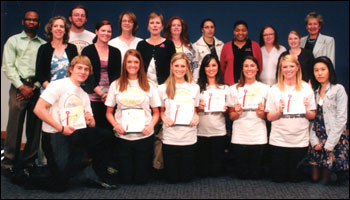African-American Children from Low-Income Families Want to Engage in Healthy Behaviors, Research Indicates
Results of an Undergraduate Study to Be Presented at Upcoming CDC Conference in Atlanta

Columbia, Mo. (July 28, 2010) — Low-income African-American children living in public housing would like to be encouraged to engage in healthy behaviors by parents and friends, according to a spring 2010 research project conducted by Missouri School of Journalism undergraduate students.
The study, funded by the Missouri Foundation for Health, will be presented at the 4th National Conference on Health Communication, Marketing, and Media, sponsored by the Centers for Disease Control and Prevention, Aug. 17-19 in Atlanta.
The research aimed to understand how low-income African-American residents, primarily children, living in public housing facilities in Columbia, Mo., define health and what they perceive as constraints from engaging in healthy lifestyles. The seniors in a strategic communication capstone course taught by doctoral student Hyunmin Lee collected data to evaluate the programs and create strategies for a social marketing campaign.
“Findings from seven focus groups with 10 adults and 30 children revealed children think being healthy mainly has to do with diet, lifestyle habits, quality of life and physical appearance.”
Findings from seven focus groups with 10 adults and 30 children revealed children think being healthy mainly has to do with diet, lifestyle habits, quality of life and physical appearance. Lee will present the collective work to individuals representing academia, public health researchers and practitioners from federal and state government and the private sector.

The results of this project will provide public health administrators with information about what residents in public housing communities think are the main threats and obstacles for engaging in healthy life. Findings pertaining to preferred communication sources and channels also will allow practitioners to identify and utilize effective spokesperson through effective communication channel to disseminate necessary health-related information.
“I am extremely proud that our students were able to apply theory-driven research for a strategic campaign for the clients, and that their work is going to be recognized at such a prestigious conference,” said Lee, who is also part of the School’s Health Communication Research Center.
The students were thrilled to learn that their work would receive national attention.
“This capstone course was more time-consuming and challenging than we had ever imagined. Being basically thrown into a working advertising agency environment with a real client gives you no room to slack or take a breather, but it tests you and makes certain that you apply your strat comm knowledge,” said Emily Burchwell, who acted as the account executive and team leader for the class project. “When we received word that we were accepted to the national conference and were slated to present, we could not believe the amazing news.”
About HCRC
The Health Communication Research Center is a grant-funded center based in the journalism school. Its primary mission is to foster interdisciplinary research to improve communication between the health care community and the public. The center capitalizes on the University of Missouri‘s strengths in health care outreach, education and prevention.
Updated: May 13, 2020
Related Stories
Expand All Collapse All- 2022
- 2020
-
2019
- Dec 17, 2019 Missouri journalism team helps public health agencies tell stories about opioids, abuse of the drugs
- Nov 15, 2019 Missouri doctoral student studies impact of Chinese anti-corruption movement news on college students
- Nov 06, 2019 Journalism professors equip students with science and information literacy skills
- Nov 04, 2019 Journalism job research finds writing and news judgment still top skills required
- 2016
- 2015
- 2014
- 2012
- 2011
-
2010
- Jul 28, 2010 African-American Children from Low-Income Families Want to Engage in Healthy Behaviors, Research Indicates
- Jun 14, 2010 Missouri Journalism Faculty, Students End Academic Year with Impressive Research Record
- Apr 15, 2010 Who Is Injured Determines Who Gets the Blame
- Mar 19, 2010 Public Health Meetings Help Communities During Epidemics, MU Study Indicates
- Mar 04, 2010 MU Researcher Finds More Effective Ways to Converge Media
-
2009
- Nov 13, 2009 MU Researchers Find Internet Search Process Affects Cognition, Emotion
- Aug 26, 2009 Online News Garners More Attention from Readers if It's Negative and Localized, MU Study Finds
- Jul 13, 2009 Strategic Communication Professor Named Associate Editor of Journal of Interactive Advertising
- Apr 08, 2009 Traditional Media Provides More Comprehensive News Than Citizen Media and Blogs, MU Researchers Find
- 2008
-
2007
- Oct 03, 2007 Claude-Jean Bertrand, Creator of the Media Accountability System (M*A*S*) Concept, Dies
- Jul 31, 2007 Portrayal of Journalists in Harry Potter Books Doesn't Negatively Affect Young Readers' Perceptions
- Mar 20, 2007 Negative Newspaper Articles about Clinical Trials Decrease Public Willingness to Participate, Study Finds
- Feb 15, 2007 Newspaper Study: Investing in the Newsroom is Good for Business
-
2006
- Oct 30, 2006 Research Abilities Develop Practical Career Skills
- Oct 06, 2006 Tan is 'In': Study Finds Light Brown More Attractive than Pale or Dark Skin
- Aug 28, 2006 Homeland Security and Media Evaluate Terror Threats Differently
- Jul 07, 2006 Having Control Might Be Good, but It's Not Interesting
- Mar 08, 2006 Reporters Believe General Public Is Unable to Understand Scientific Issues, MU Study Finds
- Feb 06, 2006 New PRIME Lab Web Site to Facilitate Sharing of Media Effects Research
- 2005
- 2004
- 2003